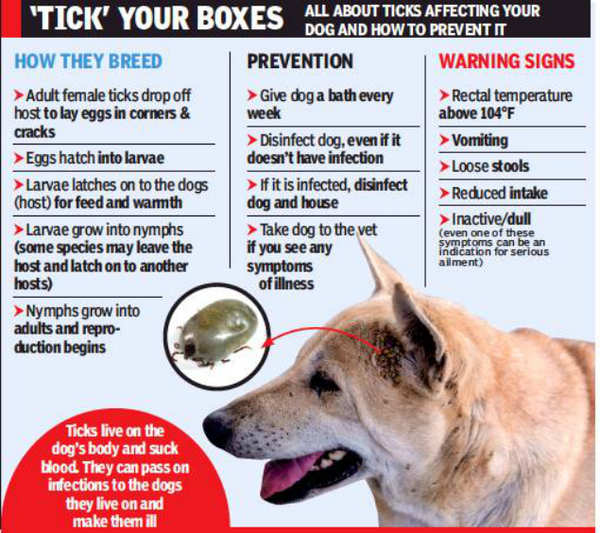- News
- City News
- chennai News
- Canine mortality sees spike from tick-borne infections
Trending
This story is from November 13, 2018
Canine mortality sees spike from tick-borne infections

It’s not uncommon for vets to see increase in tick-borne infections among dogs ahead of monsoon but what’s left vets — both at private clinics and government hospitals — worried this season is there is a sharp increase in morbidity and mortality.

There are no city-based studies, but doctors say at least three out of ten dogs brought to clinics are having tick-borne infections and nearly 40% of them die due to complications such as drop in platelets or jaundice.“If diagnosed early, medicines can cure the dogs, but in some cases it’s tough because the owners come in too late or the infection spreads very fast. In most cases it’s the second one,” said veterinarian Dr S V Sujatha of Sri Krishna Vet Clinic in Abhiramapuram. “As of now, we don’t know if a mutation or a rouge gene is causing problems, but we know its wreaking havoc to their immune systems,” she said.
The tiny eight-legged parasites stick to dog’s body while they are out for a walk or playing in the garden or the terrace. The parasites feed on the dog’s blood. Ticks, like mosquitoes, are vectors that infect the dogs with bacterial, viral or protozoan infections. “A dog may carry several ticks and may not get infected if the parasites are not infected. But just one infected tick may make a dog very sick,” said veterinarian S M Aravind Kumar of The Arc Clinic.
It may take some time for the researchers to come up with answers, but until then it is important for owners to wash their pets and disinfect them with anti-tick medications even before infections begin. It is also equally essential to know how these parasites are tough and nasty. The female ticks host on the animal, but they don’t lay eggs on the animal’s body. They drop to the ground to lay eggs on the corners, cracks and crevices around the house, sometimes on clothes and furniture.
Entomologists say they can lay an average of four to six eggs. When the eggs hatch the newborn latches on to a host for feed. “This is a reason why we recommend pre and post-exposure treatment for dogs using disinfectants. Owners should also use disinfectants around houses,” said Tanuvas professor and head of clinics Dr K Kulasekaran.

There are no city-based studies, but doctors say at least three out of ten dogs brought to clinics are having tick-borne infections and nearly 40% of them die due to complications such as drop in platelets or jaundice.“If diagnosed early, medicines can cure the dogs, but in some cases it’s tough because the owners come in too late or the infection spreads very fast. In most cases it’s the second one,” said veterinarian Dr S V Sujatha of Sri Krishna Vet Clinic in Abhiramapuram. “As of now, we don’t know if a mutation or a rouge gene is causing problems, but we know its wreaking havoc to their immune systems,” she said.
The tiny eight-legged parasites stick to dog’s body while they are out for a walk or playing in the garden or the terrace. The parasites feed on the dog’s blood. Ticks, like mosquitoes, are vectors that infect the dogs with bacterial, viral or protozoan infections. “A dog may carry several ticks and may not get infected if the parasites are not infected. But just one infected tick may make a dog very sick,” said veterinarian S M Aravind Kumar of The Arc Clinic.
It is important for pet owners to take the dogs to vets when they see them suffering from symptoms like fever, reduced food intake, fatigue, reclusiveness, loose stools or vomiting. “One of the dogs was brought to our clinic because it did not take adequate feeds for two days. We diagnosed it had tick fever and initiated treatment, but lost him in the same day,” he said. In another case, doctors noticed a dog had vomited once. But that was a key indication about drop in platelets. Luckily, the pet survived. Vets from the city are collaborating with international experts including those from EU to understand causes through research.
It may take some time for the researchers to come up with answers, but until then it is important for owners to wash their pets and disinfect them with anti-tick medications even before infections begin. It is also equally essential to know how these parasites are tough and nasty. The female ticks host on the animal, but they don’t lay eggs on the animal’s body. They drop to the ground to lay eggs on the corners, cracks and crevices around the house, sometimes on clothes and furniture.
Entomologists say they can lay an average of four to six eggs. When the eggs hatch the newborn latches on to a host for feed. “This is a reason why we recommend pre and post-exposure treatment for dogs using disinfectants. Owners should also use disinfectants around houses,” said Tanuvas professor and head of clinics Dr K Kulasekaran.
End of Article
FOLLOW US ON SOCIAL MEDIA










